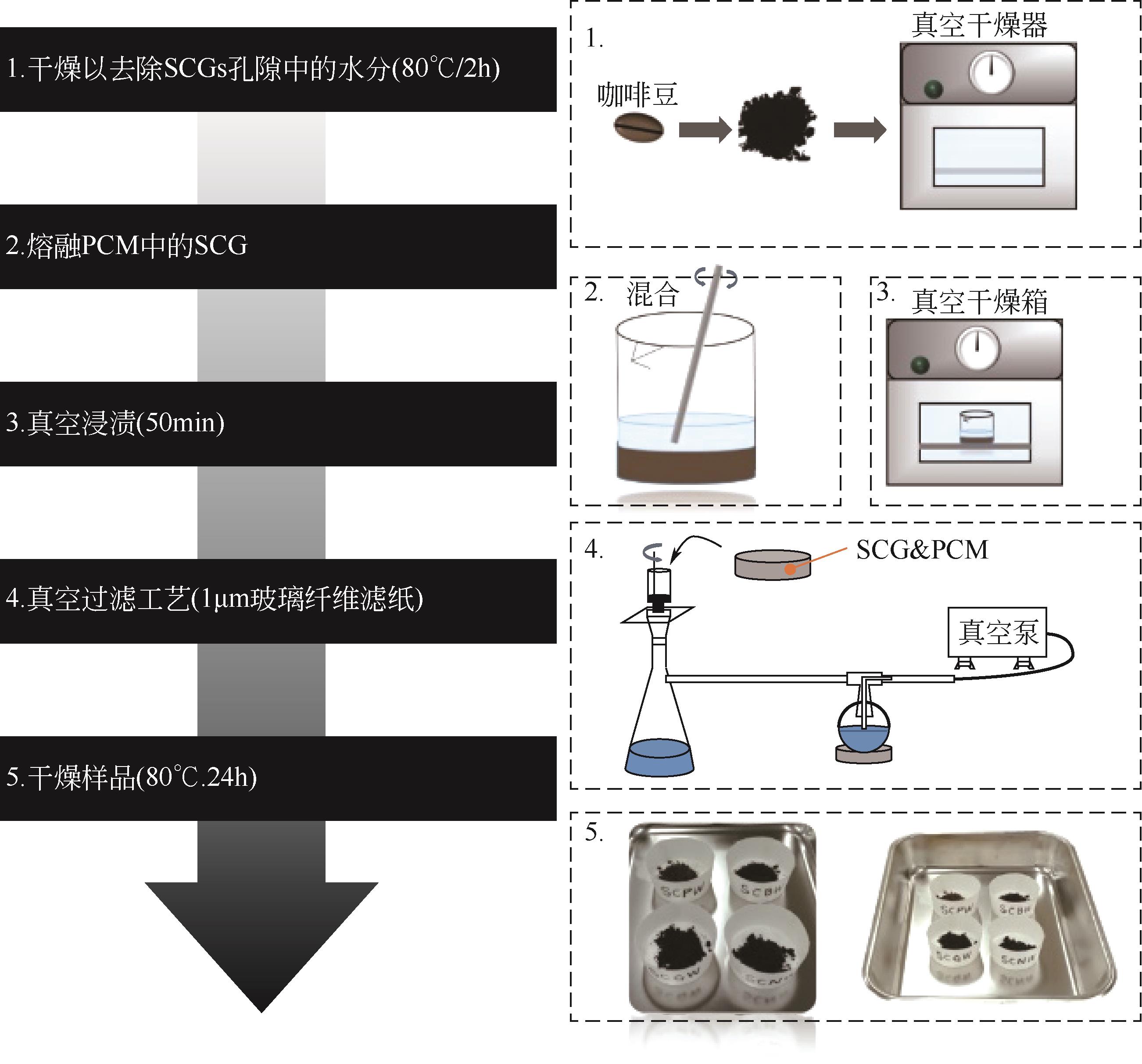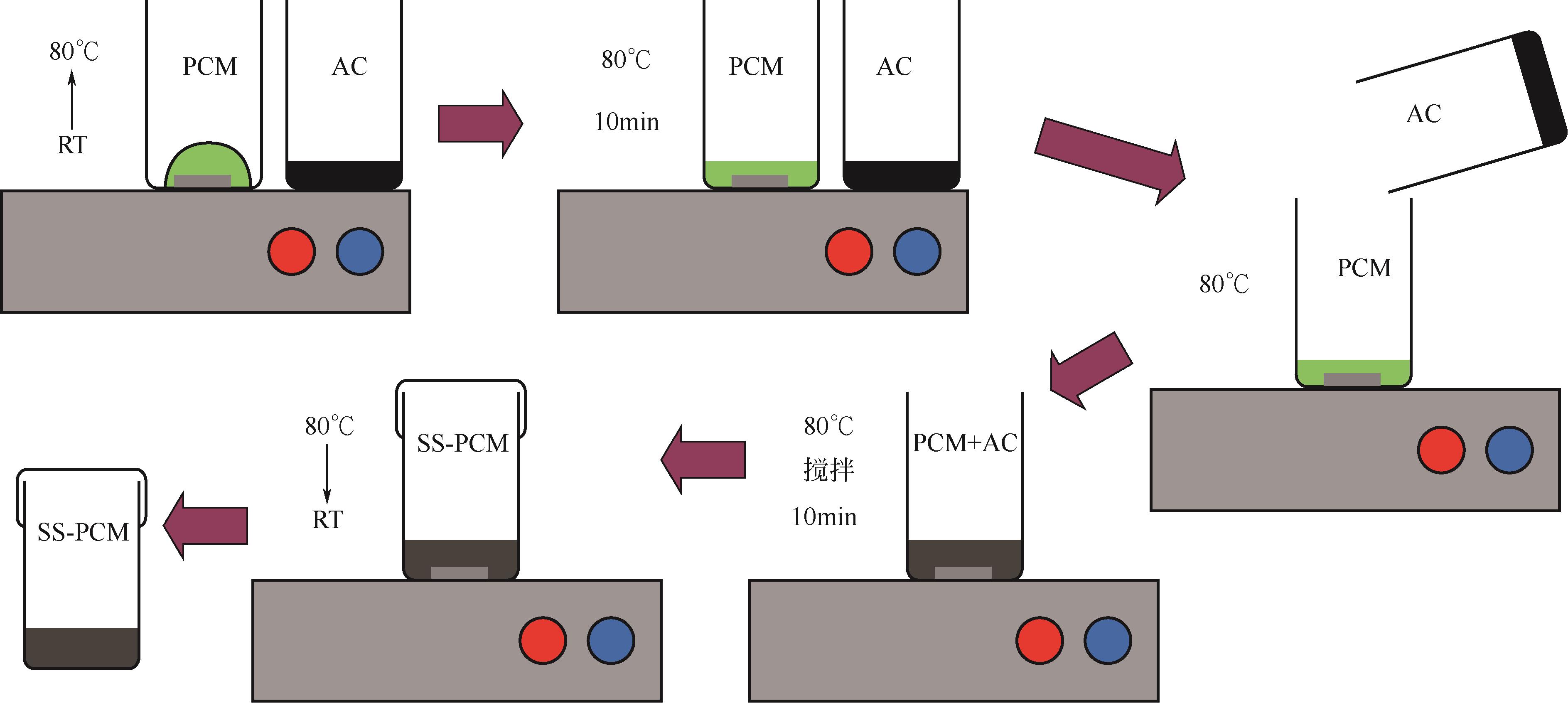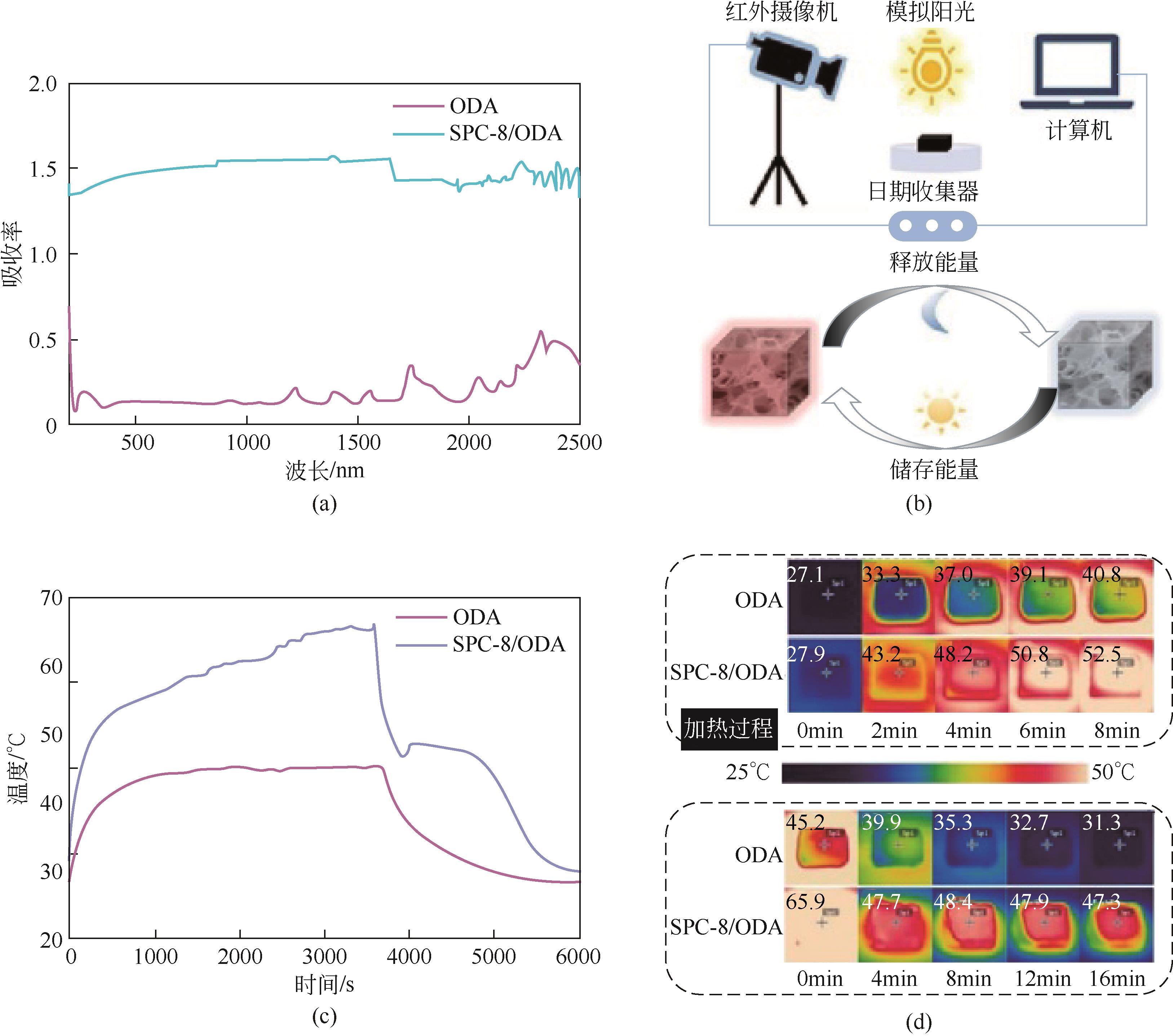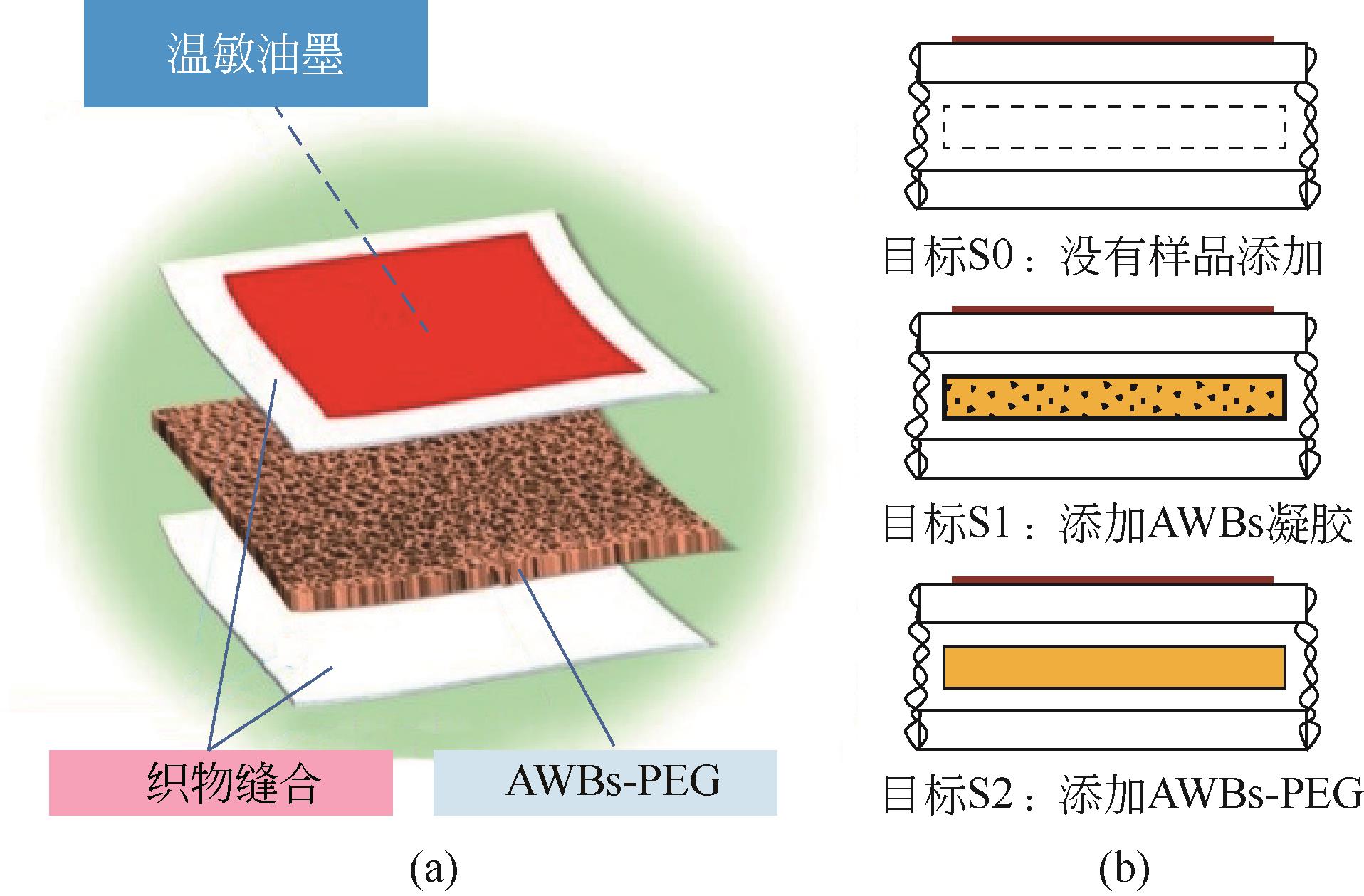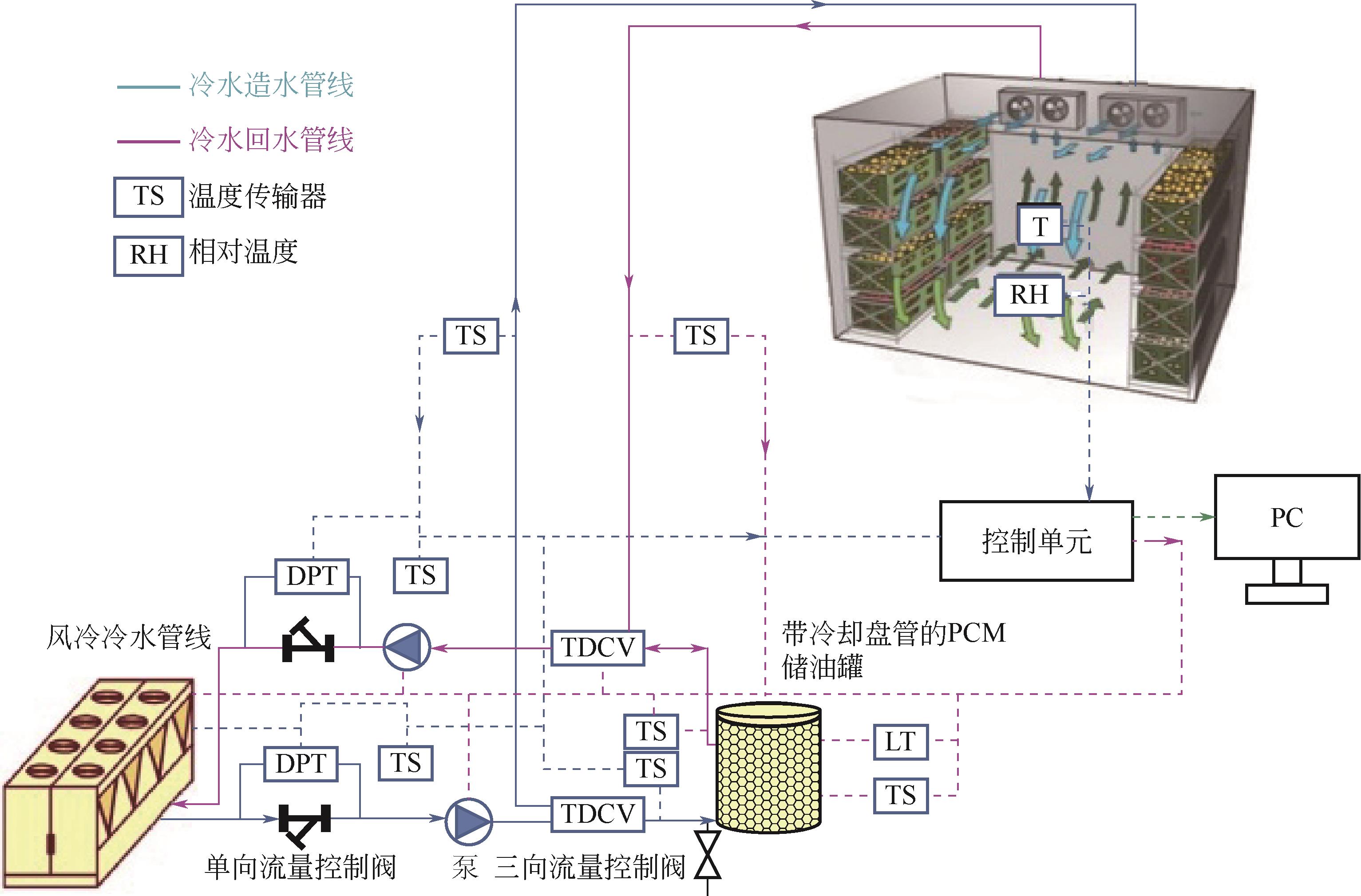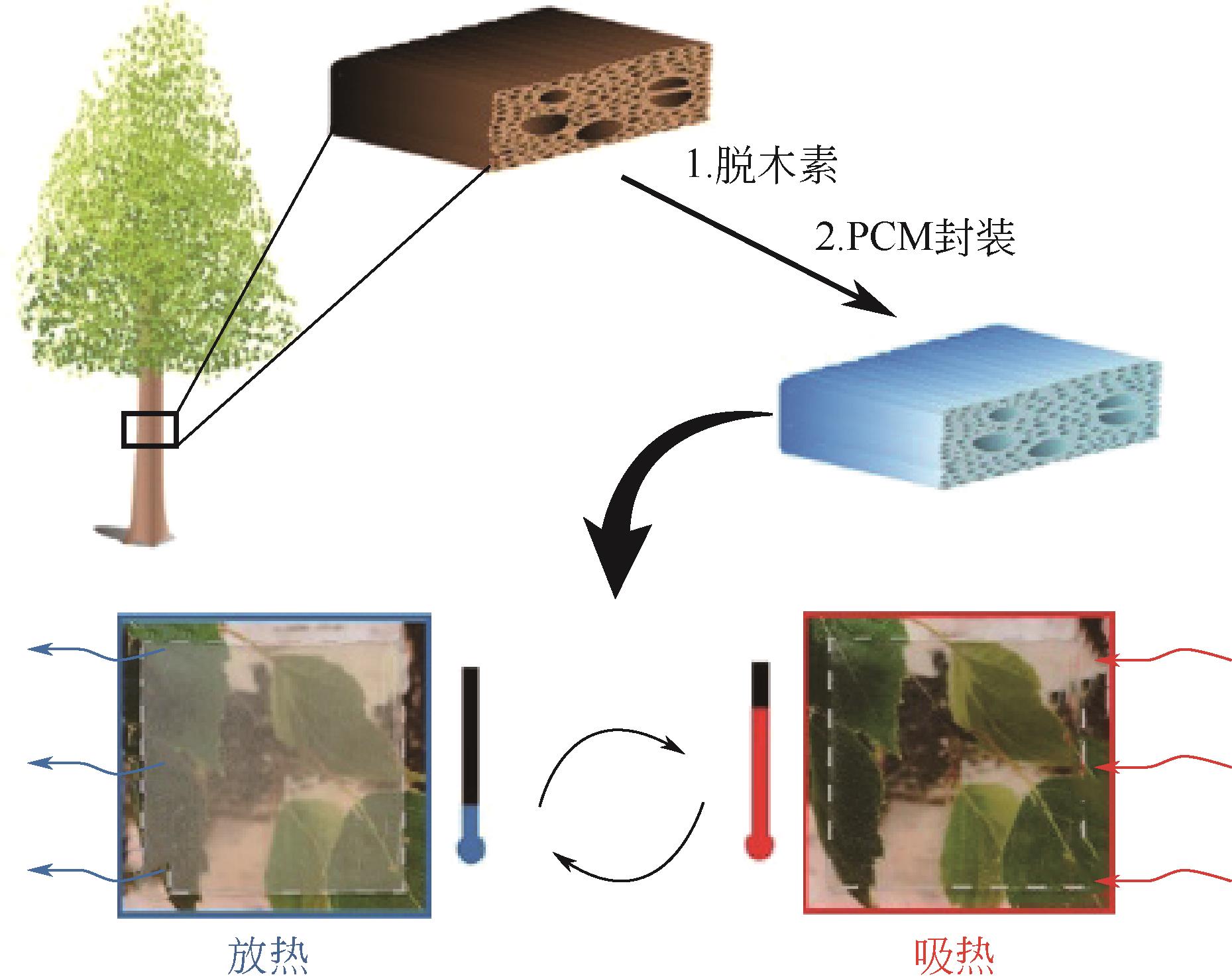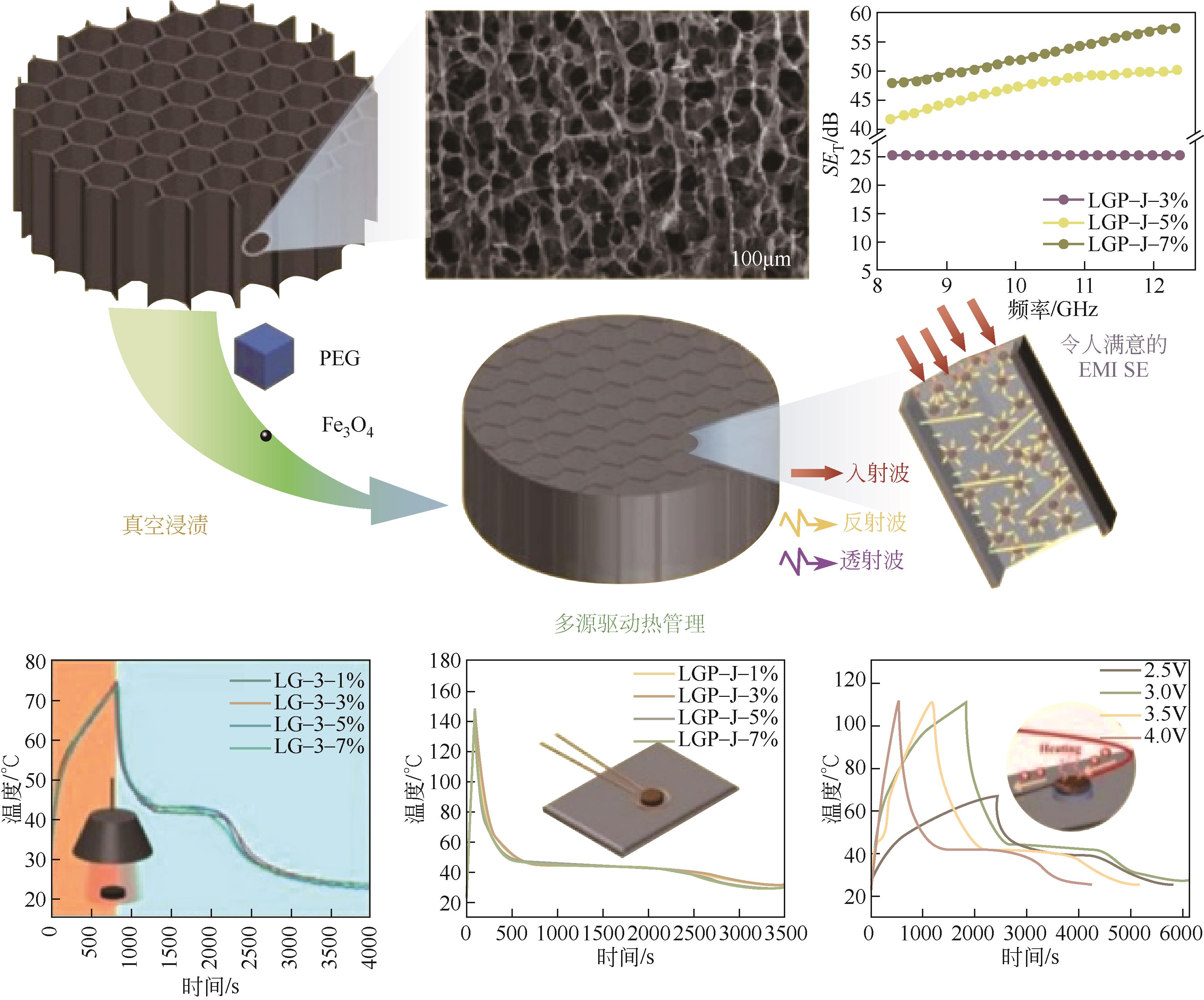Chemical Industry and Engineering Progress ›› 2024, Vol. 43 ›› Issue (7): 3934-3945.DOI: 10.16085/j.issn.1000-6613.2023-1929
• Materials science and technology • Previous Articles Next Articles
Construction and application of waste biomass composite phase change materials
JIANG Huizhen( ), LUO Kai(
), LUO Kai( ), WANG Yan, FEI Hua, WU Dengke, YE Zhuocheng, CAO Xiongjin
), WANG Yan, FEI Hua, WU Dengke, YE Zhuocheng, CAO Xiongjin
- School of Civil and Geomatics Engineering, Jiangxi University of Science and Technology, Ganzhou 341000, Jiangxi, China
-
Received:2023-11-02Revised:2023-12-29Online:2024-08-14Published:2024-07-25 -
Contact:LUO Kai
废弃生物质复合相变材料的构建与应用
江慧珍( ), 罗凯(
), 罗凯( ), 王艳, 费华, 吴登科, 叶卓铖, 曹雄金
), 王艳, 费华, 吴登科, 叶卓铖, 曹雄金
- 江西理工大学土木与测绘工程学院,江西 赣州 341000
-
通讯作者:罗凯 -
作者简介:江慧珍(2001—),女,硕士研究生,研究方向为相变材料特性。E-mail:1433923962@qq.com。 -
基金资助:国家自然科学基金(51966004);江西省自然科学基金(20212BAB204029)
CLC Number:
Cite this article
JIANG Huizhen, LUO Kai, WANG Yan, FEI Hua, WU Dengke, YE Zhuocheng, CAO Xiongjin. Construction and application of waste biomass composite phase change materials[J]. Chemical Industry and Engineering Progress, 2024, 43(7): 3934-3945.
江慧珍, 罗凯, 王艳, 费华, 吴登科, 叶卓铖, 曹雄金. 废弃生物质复合相变材料的构建与应用[J]. 化工进展, 2024, 43(7): 3934-3945.
share this article
Add to citation manager EndNote|Ris|BibTeX
URL: https://hgjz.cip.com.cn/EN/10.16085/j.issn.1000-6613.2023-1929
| 生物质载体 | 相变材料 | 实验方法 | 改善效果 |
|---|---|---|---|
| 碳化柚子皮(CPP) | PEG-4000 | 真空浸渍法 | 相变过程无泄漏 |
| 桉树木粉(WF) | PEG | 真空浸渍法 | 抗泄漏性能较好 |
| 玉米秸秆生物炭(CSBCs) | PEG | 真空浸渍法 | 有良好的抗泄漏性,导热系数提高了32% |
| 杏仁壳生物炭(ASB) | PEG | 真空浸渍法 | 相变过程无泄漏,导热系数提高了60% |
| PPF | PEG | 真空浸渍法 | 相变过程无泄漏,导热系数提高了75% |
| 生物质载体 | 相变材料 | 实验方法 | 改善效果 |
|---|---|---|---|
| 碳化柚子皮(CPP) | PEG-4000 | 真空浸渍法 | 相变过程无泄漏 |
| 桉树木粉(WF) | PEG | 真空浸渍法 | 抗泄漏性能较好 |
| 玉米秸秆生物炭(CSBCs) | PEG | 真空浸渍法 | 有良好的抗泄漏性,导热系数提高了32% |
| 杏仁壳生物炭(ASB) | PEG | 真空浸渍法 | 相变过程无泄漏,导热系数提高了60% |
| PPF | PEG | 真空浸渍法 | 相变过程无泄漏,导热系数提高了75% |
| 生物质载体 | 相变材料 | 实验方法 | 改善效果 |
|---|---|---|---|
| 活化大蒜皮(AGP) | 石蜡(PA) | 真空浸渍法 | 有良好的抗泄漏性 |
| 生物基稻壳灰(RHA) | PA | 熔融共混法 | 相变过程无泄漏,导热系数提高了77% |
| 棕榈油燃料灰(POFA) | PA | 直接浸渍法 | 有良好的抗泄漏性 |
| 废咖啡渣(C) | 蜂蜡(W) | 熔融共混法 | 没有发生明显的泄漏 |
| 生物质载体 | 相变材料 | 实验方法 | 改善效果 |
|---|---|---|---|
| 活化大蒜皮(AGP) | 石蜡(PA) | 真空浸渍法 | 有良好的抗泄漏性 |
| 生物基稻壳灰(RHA) | PA | 熔融共混法 | 相变过程无泄漏,导热系数提高了77% |
| 棕榈油燃料灰(POFA) | PA | 直接浸渍法 | 有良好的抗泄漏性 |
| 废咖啡渣(C) | 蜂蜡(W) | 熔融共混法 | 没有发生明显的泄漏 |
| 生物质载体 | 相变材料 | 实验方法 | 改善效果 |
|---|---|---|---|
| 碳化玉米秸秆(CMS) | SA | 真空浸渍法 | 有良好的抗泄漏性能,导热系数提高了87.5% |
| 碳化玉米芯(CNCC) | LA-SA | 真空浸渍法 | 相变过程无泄漏,导热系数提高了87.5% |
| 碳化甜菜浆(CSBP) | 癸酸-硬脂共晶混合物(CSEM) | 真空浸渍法 | 相变过程无泄漏,导热系数提高了79% |
| 碳化废弃大米(CAR) | 纯PA-LA | 真空浸渍法 | 相变过程无泄漏,导热系数提高了83.3% |
| 碳化胡椒秸秆(CPS) | PA | 直接浸渍法 | 有良好的抗泄漏性能 |
| 生物质载体 | 相变材料 | 实验方法 | 改善效果 |
|---|---|---|---|
| 碳化玉米秸秆(CMS) | SA | 真空浸渍法 | 有良好的抗泄漏性能,导热系数提高了87.5% |
| 碳化玉米芯(CNCC) | LA-SA | 真空浸渍法 | 相变过程无泄漏,导热系数提高了87.5% |
| 碳化甜菜浆(CSBP) | 癸酸-硬脂共晶混合物(CSEM) | 真空浸渍法 | 相变过程无泄漏,导热系数提高了79% |
| 碳化废弃大米(CAR) | 纯PA-LA | 真空浸渍法 | 相变过程无泄漏,导热系数提高了83.3% |
| 碳化胡椒秸秆(CPS) | PA | 直接浸渍法 | 有良好的抗泄漏性能 |
| 1 | TAKUDZWA Muzhanje Allan, HASSAN M A, SHINICHI Ookawara, et al. An overview of the preparation and characteristics of phase change materials with nanomaterials[J]. Journal of Energy Storage, 2022, 51: 104353. |
| 2 | KOBER T, SCHIFFER H W, DENSING M, et al. Global energy perspectives to 2060-WEC’s World Energy Scenarios 2019[J]. Energy Strategy Reviews, 2020, 31: 104353. |
| 3 | 金勇, 马吉明, 朱守真, 等. 可再生能源开发及多能互补分析——以青海为例[J]. 清华大学学报(自然科学版), 2022, 62(8): 1357-1365. |
| JIN Yong, MA Jiming, ZHU Shouzhen, et al. Renewable energy development and multi-energy complementation, taking Qinghai as an example[J]. Journal of Tsinghua University (Science and Technology), 2022, 62(8): 1357-1365. | |
| 4 | HEPBURN Cameron, QI Ye, STERN Nicholas, et al. Towards carbon neutrality and China’s 14th Five-Year Plan: Clean energy transition, sustainable urban development, and investment priorities[J]. Environmental Science and Ecotechnology, 2021, 8: 100130. |
| 5 | JIANG Tengyao, ZHANG Yali, OLAYIWOLA Saheed, et al. Biomass-derived porous carbons support in phase change materials for building energy efficiency: A review[J]. Materials Today Energy, 2022, 23: 100905. |
| 6 | HAJIALI Faezeh, JIN Tony, YANG Galen, et al. Mechanochemical transformations of biomass into functional materials[J]. ChemSusChem, 2022, 15(7): e202102535. |
| 7 | MATVEEVA V, BRONSTEIN L. From renewable biomass to nanomaterials: Does biomass origin matter? [J].Progress in Materials Science, 2022, 130: 100999. |
| 8 | YUAN Huadong, LIU Tiefeng, LIU Yujing, et al. A review of biomass materials for advanced lithium-sulfur batteries[J]. Chemical Science, 2019, 10(32): 7484-7495. |
| 9 | WANG Bin, DONG Faqin, CHEN Mengjun, et al. Advances in recycling and utilization of agricultural wastes in China: Based on environmental risk, crucial pathways, influencing factors, policy mechanism[J]. Procedia Environmental Sciences, 2016, 31: 12-17. |
| 10 | KALYANI P, ANITHA A. Biomass carbon & its prospects in electrochemical energy systems[J]. International Journal of Hydrogen Energy, 2013, 38(10): 4034-4045. |
| 11 | Chun Sheng GOH, TAN Kok Tat, LEE Keat Teong, et al. Bio-ethanol from lignocellulose: Status, perspectives and challenges in Malaysia[J]. Bioresource Technology, 2010, 101(13): 4834-4841. |
| 12 | Long QIE, CHEN Weimin, XIONG Xiaoqin, et al. Sulfur-doped carbon with enlarged interlayer distance as a high-performance anode material for sodium-ion batteries[J]. Advanced Science, 2015, 2(12): 1500195. |
| 13 | LIU Pin, LI Yunming, HU Yongsheng, et al. A waste biomass derived hard carbon as a high-performance anode material for sodium-ion batteries[J]. Journal of Materials Chemistry A, 2016, 4(34): 13046-13052. |
| 14 | ZHANG Shuai, FENG Daili, SHI Lei, et al. A review of phase change heat transfer in shape-stabilized phase change materials (ss-PCMs) based on porous supports for thermal energy storage[J]. Renewable and Sustainable Energy Reviews, 2021, 135: 110127. |
| 15 | LIU Lifang, LI Hongqiang, LAZZARETTO Andrea, et al. The development history and prospects of biomass-based insulation materials for buildings[J]. Renewable and Sustainable Energy Reviews, 2017, 69: 912-932. |
| 16 | ZHANG Hongguang, ZHU Jiaoqun, ZHOU Weibing, et al. Synthesis and thermal properties of a capric acid-modified expanded vermiculite phase change material[J]. Journal of Materials Science, 2019, 54(3): 2231-2240. |
| 17 | LIU Xingru, SU Hua, HUANG Zhongliang, et al. Biomass-based phase change material gels demonstrating solar-thermal conversion and thermal energy storage for thermoelectric power generation and personal thermal management[J]. Solar Energy, 2022, 239: 307-318. |
| 18 | SUN Yafen, ZHANG Nan, PAN Xiyu, et al. Thermal properties of biomass-based form-stable phase change material for latent heat thermal energy storage[J]. International Journal of Energy Research, 2021, 45: 20372-20383. |
| 19 | ADELEKE A A, IKUBANNI P P, ORHADAHWE T A, et al. Sustainability of multifaceted usage of biomass: A review[J]. Heliyon, 2021, 7(9): e08025. |
| 20 | HUANG Yuancheng, TANG Zheng, ZHOU Siyu, et al. Renewable waste biomass-derived carbon materials for energy storage[J]. Journal of Physics D: Applied Physics, 2022, 55(31): 313002. |
| 21 | 王成君, 苏琼, 段志英, 等. 基于多孔支撑体的形状稳定复合相变储能材料的研究进展[J]. 化工进展, 2021, 40(3): 1483-1494. |
| WANG Chengjun, SU Qiong, DUAN Zhiying, et al. Research progress of shape-stable composite phase change energy storage materials based on porous supports[J]. Chemical Industry and Engineering Progress, 2021, 40(3): 1483-1494. | |
| 22 | 张青峰, 朱钰漕, 张焕芝, 等. 生物质及其衍生材料在有机复合相变储能材料中的应用[J]. 现代化工, 2021, 41(7): 56-60, 67. |
| ZHANG Qingfeng, ZHU Yucao, ZHANG Huanzhi, et al. Application of biomass and its derived materials in organic composite phase change energy storage materials[J]. Modern Chemical Industry, 2021, 41(7): 56-60, 67. | |
| 23 | 肖力光, 李赫. 生物质基复合相变材料的研究与应用现状[J]. 化工新型材料, 2023, 51(11): 22-26. |
| XIAO Liguang, LI He. Research and application status of biomass-based composite phase change materials[J]. New Chemical Materials, 2023, 51(11): 22-26. | |
| 24 | LIU Shuang, WU Hao, DU Yu, et al. Shape-stable composite phase change materials encapsulated by bio-based balsa wood for thermal energy storage[J]. Solar Energy Materials and Solar Cells, 2021, 230: 111187. |
| 25 | FANG Yu, LIU Shuang, LI Xiaolong, et al. Biomass porous potatoes/MXene encapsulated PEG-based PCMs with improved photo-to-thermal conversion capability[J]. Solar Energy Materials and Solar Cells, 2022, 237: 111559. |
| 26 | UMAIR Malik Muhammad, ZHANG Yuang, TEHRIM Aafia, et al. Form-stable phase-change composites supported by a biomass-derived carbon scaffold with multiple energy conversion abilities[J]. Industrial & Engineering Chemistry Research, 2020, 59(4): 1393-1401. |
| 27 | 李绍伟, 傅彬彬, 李静. 碳化柚子皮基复合相变材料的制备及性能[J]. 复合材料学报, 2022, 39(6): 2885-2893. |
| LI Shaowei, FU Binbin, LI Jing. Preparation and properties of phase change composites based on carbonized pomelo peel[J]. Acta Materiae Compositae Sinica, 2022, 39(6): 2885-2893. | |
| 28 | LIANG Bin, XIANG Lu, LI Renpu, et al. Solvent-free preparation of bio-based polyethylene glycol/wood flour composites as novel shape-stabilized phase change materials for solar thermal energy storage[J].Solar Energy Materials and Solar Cells, 2019, 200: 110037. |
| 29 | LIU Shiwang, PENG Shigui, ZHANG Bingbing, et al. Effects of biochar pyrolysis temperature on thermal properties of polyethylene glycol/biochar composites as shape-stable biocomposite phase change materials[J]. RSC Advances, 2022, 12(16): 9587-9598. |
| 30 | CHEN Yan, CUI Zhixing, DING Han, et al. Cost-effective biochar produced from agricultural residues and its application for preparation of high performance form-stable phase change material via simple method[J]. International Journal of Molecular Sciences, 2018, 19(10): 3055. |
| 31 | SHENG Xinxin, DONG Dexuan, LU Xiang, et al. MXene-wrapped bio-based pomelo peel foam/polyethylene glycol composite phase change material with enhanced light-to-thermal conversion efficiency, thermal energy storage capability and thermal conductivity[J]. Composites Part A: Applied Science and Manufacturing, 2020, 138: 106067. |
| 32 | LUO Yue, ZHANG Feng, LI Chongchong, et al. Biomass-based shape-stable phase change materials supported by garlic peel-derived porous carbon for thermal energy storage[J]. Journal of Energy Storage, 2022, 46: 103929. |
| 33 | YU Kunyang, LIU Yushi, JIA Minjie, et al. Bio-based dual-functionalized phase change composite: Ultrafast solar-to-thermal conversion and reinforced heat storage capacity[J].Energy & Fuels, 2021, 35(19): 16162-16173. |
| 34 | KONG Sih Ying, Ziu Hoe SEE, LEE Chern Leing, et al. Thermal and mechanical properties of mortar incorporated with paraffin/palm oil fuel ash composite[J]. Journal of Building Engineering, 2019, 26: 100923. |
| 35 | SOUISSI Moez, TRIGUI Abdelwaheb, JEDIDI Ilyes, et al. Bio-based composite as phase change material including spent coffee grounds and beeswax paraffin[J]. Korean Journal of Chemical Engineering, 2023, 40(9): 2342-2355. |
| 36 | WEN Ruilong, LIU Yifeng, YANG Chen, et al. Enhanced thermal properties of stearic acid/carbonized maize straw composite phase change material for thermal energy storage in buildings[J]. Journal of Energy Storage, 2021, 36: 102420. |
| 37 | ZHANG Weiyi, ZHANG Xianmei, ZHANG Xiaoguang, et al. Lauric-stearic acid eutectic mixture/carbonized biomass waste corn cob composite phase change materials: Preparation and thermal characterization[J]. Thermochimica Acta, 2019, 674: 21-27. |
| 38 | Ahmet SARı, Gökhan HEKIMOĞLU, Yasemin KARABAYıR, et al. Capric-stearic acid mixture impregnated carbonized waste sugar beet pulp as leak-resistive composite phase change material with effective thermal conductivity and thermal energy storage performance[J]. Energy, 2022, 247: 123501. |
| 39 | ZHANG Xiaoguang, HUANG Zhaohui, YIN Zhaoyu, et al. Form stable composite phase change materials from palmitic-lauric acid eutectic mixture and carbonized abandoned rice: Preparation, characterization, and thermal conductivity enhancement[J]. Energy and Buildings, 2017, 154: 46-54. |
| 40 | GU Xiaobin, LIU Peng, LIU Changjiang, et al. A novel form-stable phase change material of palmitic acid-carbonized pepper straw for thermal energy storage[J]. Materials Letters, 2019, 248: 12-15. |
| 41 | 陈子禾, 赵呈志, 冒文莉, 等. 定向生物质多孔碳复合相变材料的制备及其热性能研究[J]. 化工学报, 2022, 73(4): 1817-1825. |
| CHEN Zihe, ZHAO Chengzhi, MAO Wenli, et al. Preparation and thermal properties of phase change composites supported by oriented biomass porous carbon[J]. CIESC Journal, 2022, 73(4): 1817-1825. | |
| 42 | 尚建丽, 陈丹, 武斌. 生物质多孔相变材料的制备及调温调湿性能研究[J]. 化工新型材料, 2015, 43(1): 107-109, 113. |
| SHANG Jianli, CHEN Dan, WU Bin. Preparation of the biomass porous phase change materials and its thermal and moisture properties[J]. New Chemical Materials, 2015, 43(1): 107-109, 113. | |
| 43 | YOO Jiwon, CHANG Seong Jin, Seunghwan WI, et al. Spent coffee grounds as supporting materials to produce bio-composite PCM with natural waxes[J]. Chemosphere, 2019, 235: 626-635. |
| 44 | MUCHTAR Ahmad Rifqi, HASSAM Christopher L, SRINIVASAN Bhuvanesh, et al. Shape-stabilized phase change materials: Performance of simple physical blending synthesis and the potential of coconut based materials[J]. Journal of Energy Storage, 2022, 52: 104974. |
| 45 | TIAN Shu, YANG Ruiying, PAN Zihan, et al. Anisotropic reed-stem-derived hierarchical porous biochars supported paraffin wax for efficient solar-thermal energy conversion and storage[J]. Journal of Energy Storage, 2022, 56: 106153. |
| 46 | WANG Chengjun, LIANG W, YANG Yueyue, et al. Biomass carbon aerogels based shape-stable phase change composites with high light-to-thermal efficiency for energy storage[J].Renewable Energy, 2020, 153: 182-192. |
| 47 | CHEN Yan, HE Huihong, LI Jiahao, et al. Waste sugarcane skin-based composite phase change material for thermal energy storage and solar energy utilization[J]. Materials Letters, 2023, 342: 134320. |
| 48 | 禹兴海, 李艳安, 唐海慰, 等. 生物炭/二十烷复合定型相变材料制备及其光热、电热转换和储存性能[J]. 复合材料学报, 2023, 40(1): 310-322. |
| YU Xinghai, LI Yan’an, TANG Haiwei, et al. Form-stabilized phase change composites based on biochar and n-Eicosane for photo-and electro-thermal conversion and heat storage[J]. Acta Materiae Compositae Sinica, 2023, 40(1): 310-322. | |
| 49 | WEN Ruilong, ZHANG Weiyi, LV Zhenfei, et al. A novel composite Phase change material of Stearic Acid/Carbonized sunflower straw for thermal energy storage[J]. Materials Letters, 2018, 215: 42-45. |
| 50 | XIA Rongqi, ZHANG Weiye, YANG Yingni, et al. Transparent wood with phase change heat storage as novel green energy storage composites for building energy conservation[J]. Journal of Cleaner Production, 2021, 296: 126598. |
| 51 | 项东, 王诗涵, 范小红, 等. 水合硝酸锰复合果壳多孔碳的相变热储能研究[J]. 山东建筑大学学报, 2019, 34(1): 20-27. |
| XIANG Dong, WANG Shihan, FAN Xiaohong, et al. Phase change thermal energy storage of shell porous carbon composite manganese nitrate hydrate[J]. Journal of Shandong Jianzhu University, 2019, 34(1): 20-27. | |
| 52 | CHIN Chun On, YANG Xu, PAUL Suvash Chandra, et al. Development of thermal energy storage lightweight concrete using paraffin-oil palm kernel shell-activated carbon composite[J]. Journal of Cleaner Production, 2020, 261: 121227. |
| 53 | ZHANG Xiugui, DONG Mingyang, SHI Junqing, et al. Construction of wheat bran biomass porous aerogel by starch pasting for fabrication of phase change composites with high latent heat storage and temperature regulation[J]. Energy & Fuels, 2023, 37(8): 6110-6121. |
| 54 | Imran HUSSAIN S, DINESH R, Ameelia ROSELINE A, et al. Enhanced thermal performance and study the influence of sub cooling on activated carbon dispersed eutectic PCM for cold storage applications[J]. Energy and Buildings, 2017, 143: 17-24. |
| 55 | HE Bo, SETTERWALL Fredrik. Technical grade paraffin waxes as phase change materials for cool thermal storage and cool storage systems capital cost estimation[J]. Energy Conversion and Management, 2002, 43(13): 1709-1723. |
| 56 | MONTANARI Céline, LI Yuanyuan, CHEN Hui, et al. Transparent wood for thermal energy storage and reversible optical transmittance[J]. ACS Applied Materials & Interfaces, 2019, 11(22): 20465-20472. |
| 57 | SHEN Rongbiao, WENG Mengman, ZHANG Li, et al. Biomass-based carbon aerogel/Fe3O4@PEG phase change composites with satisfactory electromagnetic interference shielding and multi-source driven thermal management in thermal energy storage[J]. Composites Part A: Applied Science and Manufacturing, 2022, 163: 107248. |
| [1] | LI Junliang, LI Yue, SUN Daolai. Hydrodeoxygenation of 1,2-butanediol to 1-butanol over Cu/SiO2-Al2O3 catalyst [J]. Chemical Industry and Engineering Progress, 2025, 44(S1): 222-231. |
| [2] | GAN Yufeng, CHEN Jingran, ZHOU Zhihua, PAN Chunrong, ZHANG Daqian, ZHONG Junwei. Research on paraffin-based composite phase change materials and applications in energy storage systems [J]. Chemical Industry and Engineering Progress, 2025, 44(S1): 277-287. |
| [3] | LI Ruiying, ZHOU Ying, ZHOU Hongjun, XU Chunming. Biomass-derived nano-carbon-based materials: Opportunities and challenges in electrochemical applications [J]. Chemical Industry and Engineering Progress, 2025, 44(S1): 288-306. |
| [4] | HONG Kang, ZHANG Chong, MA Hongli, SUN Yongrong, JIANG Liqun, BAO Guirong. Research progress of biomass hard charcoal as an anode material for sodium-ion batteries [J]. Chemical Industry and Engineering Progress, 2025, 44(S1): 340-349. |
| [5] | WU Gang, SHEN Zhenhua, JIAO Feng, HE Yongqing. Characterization of melting heat transfer properties of metal-foam composite phase change materials under non-uniform heat flow [J]. Chemical Industry and Engineering Progress, 2025, 44(S1): 388-399. |
| [6] | CHENG Qiwen, LI Qinghua, WANG Haofan, CAO Yonghai, WANG Hongjuan, YU Hao. Preparation and tribological properties of oleylamine-modified carbon coated molybdenum disulfide composites [J]. Chemical Industry and Engineering Progress, 2025, 44(S1): 400-412. |
| [7] | BAO Xinde, LIU Biye, HUANG Renwei, HONG Yuhao, GUAN Xin, LIN Jinguo. Preparation of biomass-based@CuNiOS composite catalysts for the reduction of organic dye [J]. Chemical Industry and Engineering Progress, 2025, 44(S1): 185-196. |
| [8] | JIANG Chunxi, LIN Dingbiao, BIAN Yao, ZHOU Wei, LU Haifeng, GUO Xiaolei, LIU Haifeng. Characteristics of rice husk as entrained-flow bed gasification feedstock and their impact on the process [J]. Chemical Industry and Engineering Progress, 2025, 44(9): 4937-4944. |
| [9] | ZHANG Wenjing, HUANG Zhixin, LI Shiteng, DENG Shuai, LI Shuangjun. Biomass carbon aerogels for CO2 adsorbents [J]. Chemical Industry and Engineering Progress, 2025, 44(9): 5018-5032. |
| [10] | LI Ka, XIA Yuxuan, WU Xiaoqin, YI Lan, LUO Hao. Pore scale computational fluid dynamics (CFD) simulation of a double-layer porous medium combustion reactor [J]. Chemical Industry and Engineering Progress, 2025, 44(8): 4381-4393. |
| [11] | DAI Guilong, WANG Xiaoyu, HUANGFU Jiangfei, GONG Lingzhu. Convection heat transfer characteristics of pore-scale Laguerre Voronoi open-cell foam [J]. Chemical Industry and Engineering Progress, 2025, 44(8): 4394-4407. |
| [12] | LI Haodong, SHEN Shengqiang, CHEN Liang. Numerical simulation on ammonia-hydrogen combustion exhaust heat utilization coupling ammonia cracking process for hydrogen production [J]. Chemical Industry and Engineering Progress, 2025, 44(8): 4443-4453. |
| [13] | MI Yifang, WANG Baoguo, WANG Wenqiang, SUN Guojin, CAO Zhihai. Preparation of nitrogen self-doped cyanobacterial biomass-based activated carbon for CO2 adsorption [J]. Chemical Industry and Engineering Progress, 2025, 44(7): 4223-4232. |
| [14] | YANG Xinliu, LIU Qiang, CAO Qian, CUI Yueming, FANG Chaohe. Effect of reservoir seepage on heat transfer performance of a single-well downhole coaxial geothermal heat exchanger [J]. Chemical Industry and Engineering Progress, 2025, 44(7): 3860-3868. |
| [15] | CHEN Dongjian, SUN Yuqian, YIN Fengxiang. Preparation of FeNi3-Fe3O4/CN electrocatalysts and their electrocatalytic oxygen evolution performance [J]. Chemical Industry and Engineering Progress, 2025, 44(7): 3928-3937. |
| Viewed | ||||||
|
Full text |
|
|||||
|
Abstract |
|
|||||


